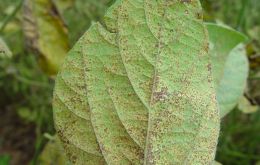MercoPress. South Atlantic News Agency
Tag: Embrapa Soja
-
Saturday, December 23rd 2017 - 09:46 UTC
Chemicals less and less effective against Asian rust in Brazil's soybean fields

Over almost two decades, a plant disease known as Asian rust has infiltrated soybean fields across Brazil -- the world’s biggest exporter of the versatile oilseed used in countless consumer products. But the pathogen has become so resistant to chemicals meant to kill it that many farmers spray several times during their growing seasons, and still endure output losses.
-
Wednesday, July 10th 2013 - 17:35 UTC
Brazil’s research company which turned the country into world breadbasket turns 40

Embrapa (Empresa Brasileira de Pesquisas Agropecuarias) created tropical agriculture in Brazil, thus allowing the country to become the giant food producer it is today. Hailed for the work done in adapting soybeans to the hot, humid, acidic climes of the Cerrado savannah, where nearly 17% of the world's beans are now cultivated, the state-run research company is a national treasure.
